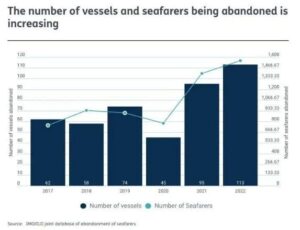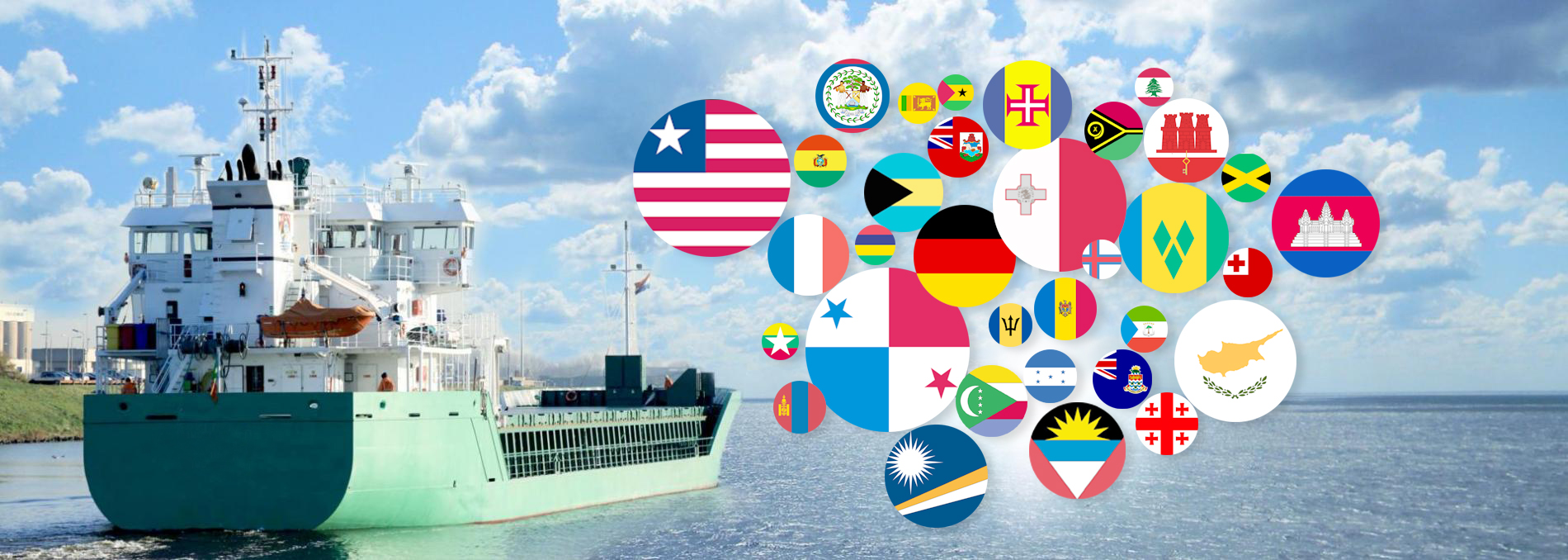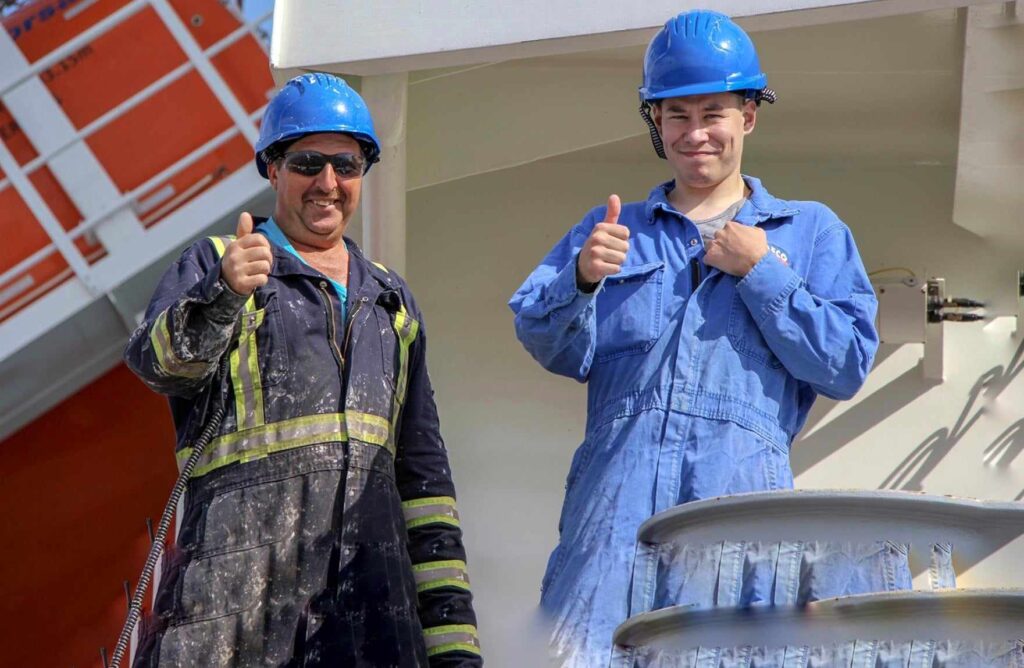
By :Nouhed Chine
Each year on June 25 th, the global maritime community celebrates the day of seafarers as a recognition of their contribution to the global economy.
International maritime shipping holds the most crucial role in facilitating the transportation of more than 90% of the world’s goods.
The sea is an extremely hostile and dangerous environment making the seafarer’s onboard life one of the hardest and most risky jobs in the world.
For this reason, the International Maritime Organization (IMO) is undertaking continuous efforts to develop appropriate regulations to ensure the safety and security of navigation.
Despite these efforts, the number of ship accidents increases every year. Most of these issues are related to human factors, particularly the fatigue experienced by seafarers, as confirmed by the BEA MER and the European Maritime Safety Agency (EMSA) statistics reports.
Fatigue is defined by the IMO as “a state of feeling tired, weary, or sleepy that results from prolonged mental or physical work, extended periods of anxiety, exposure to harsh environments, or loss of sleep.”
Human error is frequently the principal cause of maritime accidents, but seafarers also confront considerable risks of accidents that could harm their lives.
In this context, the International Labour Organization (ILO), in collaboration with the shipowner’s organization and the seafarer’s representatives, is working for the implementation of maritime labor regulation to preserve the seafarer’s rights to decent work. This is fundamentally accomplished through the Maritime Labour Convention (MLC) 2006, which sets out comprehensive rights and protection at work for seafarers.

ILO has developed a supervisory system that is unique at the international level and that supports countries in implementing the conventions they ratify. The ILO systematically examines the application of standards in member states and identifies areas where they could be effectively applied. The ILO assists countries through social dialogue and technical assistance in case of difficulties in the application.

The sea is an extremely hostile and dangerous environment making the seafarer’s onboard life one of the hardest and most risky jobs in the world.
Additionally, there are many other issues that could worsen the situation of seafarers on board, but this list is not exhaustive:
Issues of payment wages
Inadequate and poor-quality food
Risks of piracy,
health contamination
Repatriation delays following completion of contracts.
However, the most complicated case for seafarers could be abandonment, that is defined by the Maritime Labour Convention as; “a seafarer shall be deemed to have been abandoned where, in violation of the requirements of the Convention or the terms of the seafarers’ employment agreement, the shipowner: (a) fails to cover the cost of the seafarer’s repatriation; or (b) has left the seafarer without the necessary maintenance and support; or (c) has otherwise unilaterally severed their ties with the seafarer including failure to pay contractual wages for a period of at least two months”.
According to The International Transport Workers’ Federation (ITF), the number of abandoned cases has increased during the last four years.

The year 2023 was the worst ever for seafarers’ abandonment. ITF recorded the highest level of abandoned vessels (129 cases) and abandoned seafarers (1,983).
Regarding these abandonment statistics, It’s clear that there has been a big failure by some owners to fulfill their obligations to repatriate seafarers and flag states to implement and enforce these requirements

“Flags of «convenience” or tax havens.
The maritime world is currently dominated by a free-trade economy established in the 20th century, which is characterized by the unrestricted registration of ships. This means that the flag state of the ship is no longer necessarily the State where the ship is built and/or has had its act of nationality, but it can also be the state where the ship is registered, conforming to the convention on the international law of the sea (UNCLOS 82).
This free registration led to the creation of the flags of «convenience» or tax havens. Private shipowners have resorted to these flags to escape the excessive charges of registrations in their home states and to recruit the cheapest seafarers, pay minimal wages, and cut costs by lowering standards of living and working conditions for the crew. Which has led to a lack of serious control of these vessels by these states and the degradation of minimum safety standards.
Vessels that are unable to meet the standards required by the International Maritime Organization conventions, are operating in hazardous conditions and pose a serious risk to seafarers’ safety.
Abdul Nasser Saleh, an engineer on board the Al Maha vessel who has been abandoned for 12 years !!
The most striking example we can provide here is about Abdul Nasser Saleh, an engineer on board the Al Maha vessel who has been abandoned for 12 years and is finally home with his family in Egypt. Due to the support of ITF inspectors, “I was in great distress. Living conditions were extremely poor. And that can’t be compared to my stress and my family’s” Abdul told the ITF.
The ITF Flags of Convenience Network Coordinator replies, “at the ITF, we will never accept the abandonment of any seafarer as just one of those things. Nor do we accept the impunity with which some ship owners deal with their crew as if this is normal.”
“We witness seafarers with no contracts, unpaid for months, and where the mere call to the ITF or to one of our unions to seek assistance results in threats and pressure.”
Seafarers, who are vital to global trade, deserve fair treatment and solid protection. It’s time for the maritime community to hold flag states accountable and ensure a fair deal for those at sea.
“Every seafarer has a right to decent working and living conditions on board ship and health protection, medical care, welfare measures and other forms of social protection.” Art IV-MLC 2006.
International organisations are still facing significant challenges in enhancing cooperation and collaboration with member states to establish an effective mechanism for the implementation and enforcement of maritime instruments. All these efforts are necessary to preserve the rights of seafarers and ensure their safety and security onboard vessels.
In response, proactive international strategic actions must be anticipated and meticulously planned to mitigate concerning statistics and avoid alarming figures.





Very good article. Raising awareness, training and assistance of international organisations in ratification, implementation and enforcement of conventions are highly recommended.
Sincer appreciations